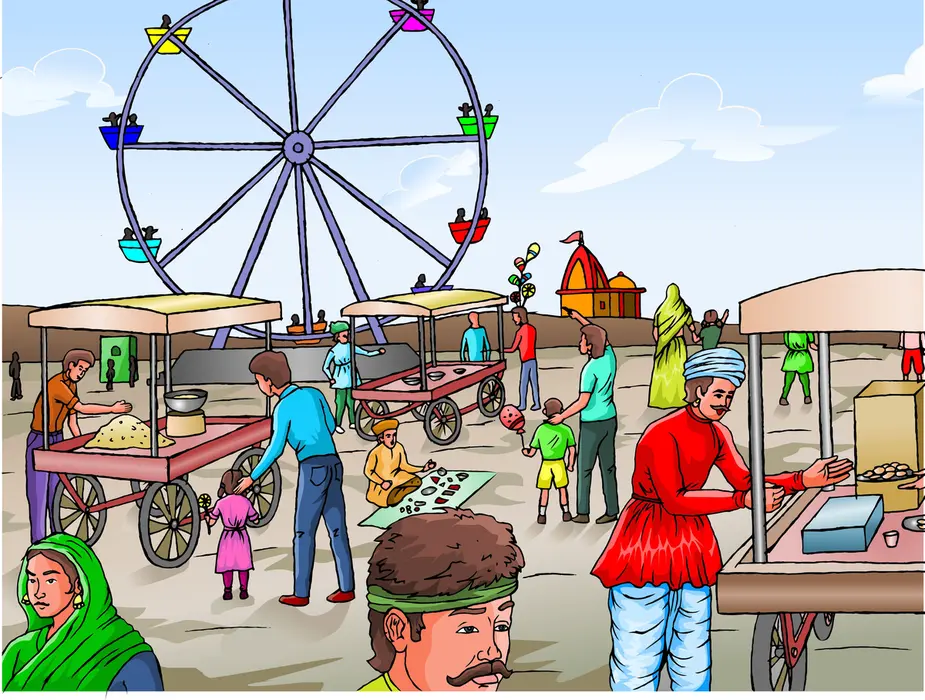Introduction
Mulk Raj Anand is the author of the tale “The Lost Child.” He intended for this tale to emphasize the value of parents in a child’s life. Kids can believe that their parents are harsh or reprimand them unnecessarily but they care for their child dearly. The protagonist of the tale is a little child who accompanied his parents to a local fair. His father consistently declined his requests to buy him the toys he wanted and did not allow him to go anywhere alone. Unfortunately, the boy got lost in the fair and understood the importance of his parents in his life.
Summary
The narrative centers on a little boy who went to a fair with his parents. He was attending the spring festival. The fair was attended by the entire village. Some came on horses, some people were driving bullock carts while others were driving bamboo carts. The kid noticed a toy store by the roadside just as he entered the fair. Despite being aware that he couldn’t take them, he begged his parents to let him have the toy. His father turned down his request and his mother diverted his attention by pointing out the lovely mustard fields.The little boy tried to grab one of those bright insects, but when his mother called him to the sidewalk, he rushed joyously in their direction. He was circling the banyan tree, but again when his parents yelled, he made his way toward them.
The young child then went after his parents and found a sweet shop. The shop sold a variety of sweets, including laddus, barfi, and gulab jamun. The kid wanted the Barfi because it was his favorite, but he knew he wouldn’t get it, so he walked away from the store. After traveling a short distance, the boy discovered a vendor selling Gulmohar garlands.The kid ran towards the vendor but stopped himself when he saw his parents’ expressions.
He then followed his parents inside the fair where he observed a man standing with red, yellow, green, and purple balloons, he wanted to buy them, but his parents once again stopped him. He also noticed the snake charmer and wanted to watch more of the play, but his parents forbade him from hearing the music, so he left again with his parents. He then noticed a roundabout where people were having fun on a swing, thus, the boy boldly demanded that he wanted to ride the swing and asked his parents to allow him to ride the roundabout. His parents did not respond to this demand, and thus he realized that they were not present. He began searching around but was unable to find them.

The young child became terrified and began to rush while searching for his parents. When he saw no sign of them, he began to sob. He was constantly finding for his parents throughout the fair. He visited a shrine where there was a large crowd, and the temple’s entrance was packed. He was continuously crying there also. The weeping toddler kept begging for his mother. A man in the crowd heard his cry and lifted him. This man led the kid to the swing and asked him if he wanted to ride in order to calm him down. The child kept crying and stated he wanted his parents. The boy continued to cry as the guy took him to a balloon store, a sweet shop, a toy shop, and all the fun places in the fair. He only and only wanted his parents and thus kept on crying.
Online English Tuition. Detailed notes of the lesson.
The Lost Child About The Author

Mulk Raj Anand was a highly educated Indian writer, born in Peshawar to a family of coppersmiths. He produced a remarkable body of work that includes several short stories, novels, and essays, and was one of the first Indian writers to write in English and gain popularity at an international scale. After graduating with honors from Punjab University, Anand went to University College, London, where he worked at a restaurant to finance his education. He later earned a PhD from Cambridge University, during which time he became involved in India’s struggle for independence. Anand’s works often highlighted social and political issues in India, and were known for their empathetic portrayal of marginalized communities. “The Lost Child,” one of his most famous short stories, is a poignant reflection on the fleeting nature of worldly pleasures.
Quick Bio
| Name | Mulk Raj Anand |
|---|---|
| Birthdate | December 12, 1905 |
| Place of Birth | Peshawar, British India (now in Pakistan) |
| Death Date | September 28, 2004 |
| Occupation | Novelist, essayist, and critic |
| Notable Works | “Untouchable”, “Coolie”, “Two Leaves and a Bud”, “The Village”, “The Sword and the Sickle” |
| Literary Movement | Indian English literature, Progressive Writers’ Movement |
| Education | University of London (PhD in philosophy) |
| Awards and Honors | Padma Bhushan (1967), Sahitya Akademi Award (1952) |
| Influences | Charles Dickens, Rabindranath Tagore |
| Important themes in his writing | Social inequality, caste system, poverty, colonialism, education, and empathy for the marginalized |
| Significance | One of the pioneers of Indian English literature and a prominent voice in the Indian independence movement. His works helped raise awareness about the issues faced by the lower castes and the working class in India. |
Conclusion
In this tale, the young boy wanted to buy everything he saw when he was with his parents. But once he got separated from his parents he lost interest in all those things. The boy refused the man when he tried to comfort him while, by giving him toys, sweets, taking him on a ride, etc. He did not want all these things but only desired his mother and father. From this story, we can understand that the most important part of a child’s life is his parents and they should be respected and valued because without our parents we would definitely be lost.
TextBook Questions and Answers:
Q.1 What are the things the child sees on his way to the fair? Why does he lag?
Ans: The child sees toys, balloons, a sweet shop, a snake charmer, and swings at the fair.
The young child lags behind because he was so fascinated by the scenery that he ran to every store and wanted to buy everything.
Q.2 In the fair he wants many things. What are they? Why does he move on without waiting for an answer?
Ans: He wanted toys, balloons, sweets, and a swing ride at the fair.
He left without waiting for his parents to respond because he noticed their expressions and knew they would not give him what he wants.
Q.3 When does he realize that he has lost his way? How have his anxiety and insecurity been described?
Answer: Near the swing at the roundabout, when he didn’t hear his parents’ response, he turned around and found that he was all alone and by himself.He was panicking, he was crying and calling his father and mother.
Q.4 Why does the lost child lose interest in the things that he had wanted earlier?
Ans: The child lost interest in the things he had previously desired because he was lost and only wanted his mother and father.
Q.5 What do you think happens in the end? Does the child find his parents?
Ans: Yes, I believe that man helped the boy in the end to find his parents.
The Lost Child Class 9 Extra Questions and Answers
1. Who came to the lost child’s aid?
Ans: The man in the shrine found the kid. He tried to calm him by lifting him in his arms.
He offered to purchase him flowers, balloons, and sheets as he led him to the closest roundabout swing.
2. What does “The Lost Child” stand for?
Ans: The lost infant represents all of humanity’s desire for worldly goods. People take for granted the valuable blessings in life that are provided for free. One only understands its actual worth when one loses these precious gifts.
3. What is the irony of the tale The Lost Child?
Ans: The irony of the tale “The Lost Child” is that the child was upset by his parents’ refusal to let him purchase whatever he wanted at the local fair. But when he was separated from his parents he only wanted his mother and father back.
If you require assistance with English lessons, feel free to join our 9th class English tuitions. In these classes, students will explore a diverse range of topics such as Literary Comprehension, Informal Letter Writing, Diary Entry Writing, and Dialogue Writing.


